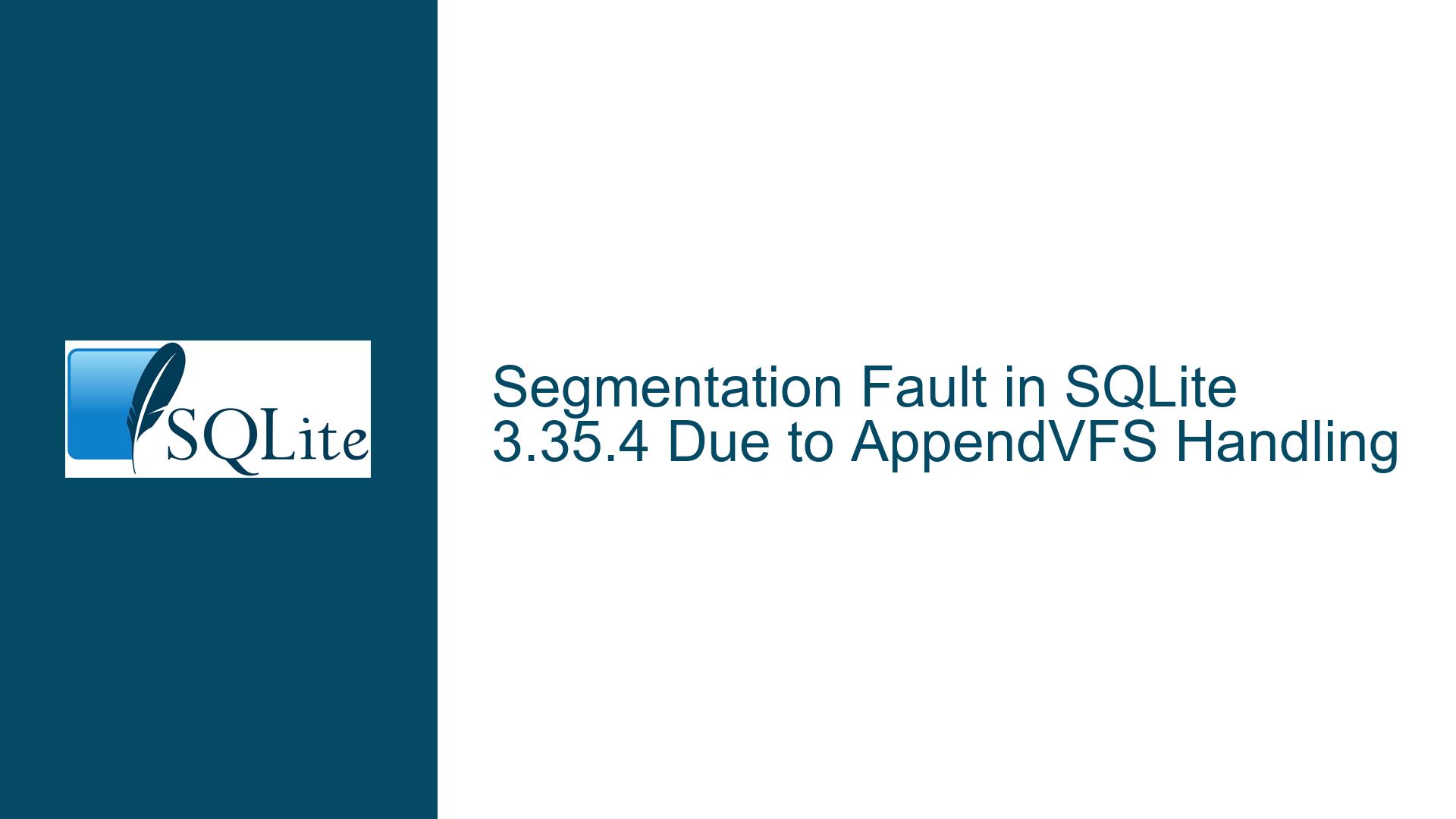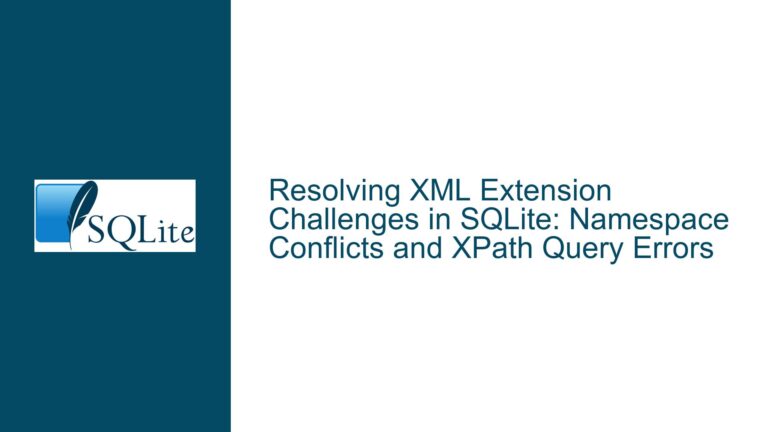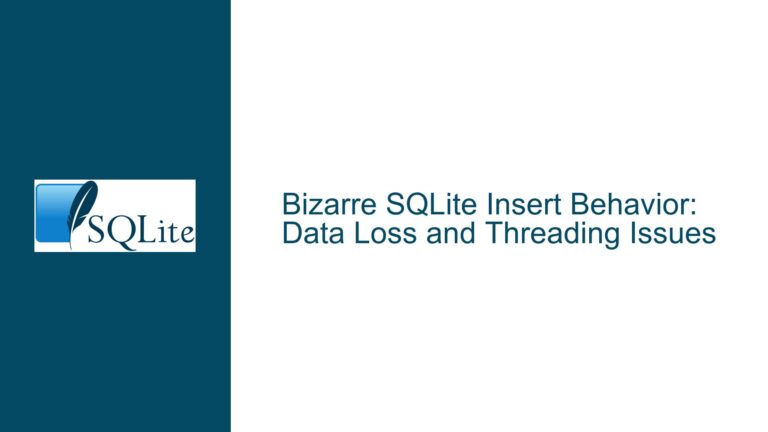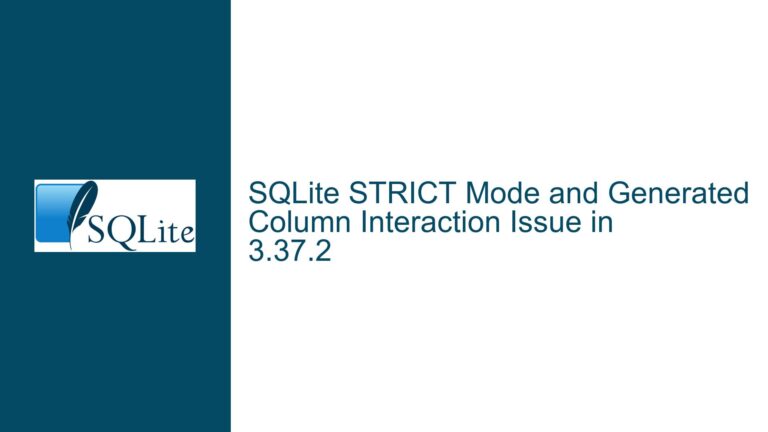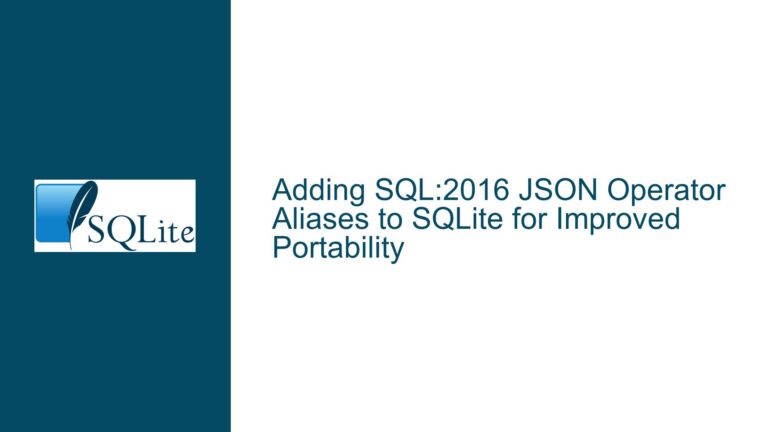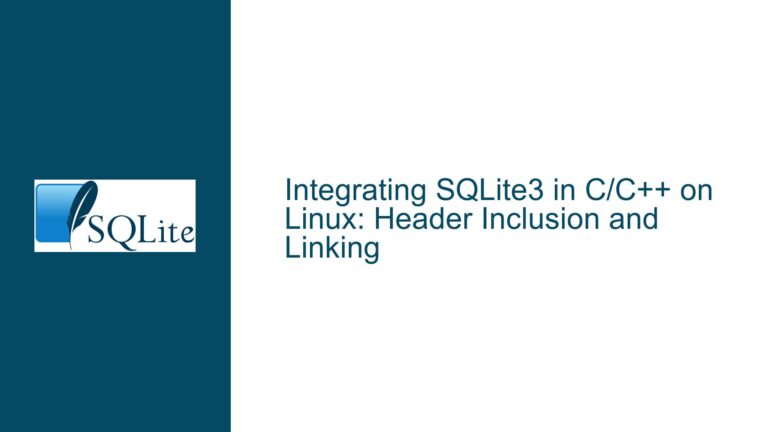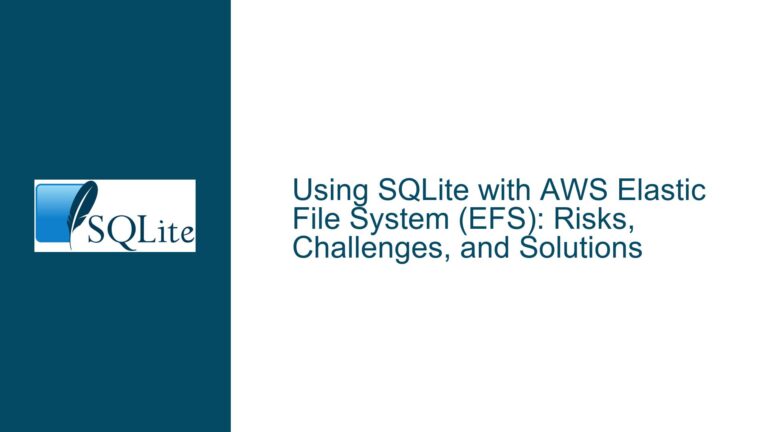Segmentation Fault in SQLite 3.35.4 Due to AppendVFS Handling
Segmentation Fault During AppendVFS File Opening
The core issue revolves around a segmentation fault (segfault) occurring in SQLite version 3.35.4 when attempting to use the AppendVFS (Virtual File System) to open a file. The fault manifests specifically in the apndOpen function, which is part of the SQLite shell’s implementation of the AppendVFS. The fault is triggered when the AppendVFS attempts to open a file that does not exist or is not readable, leading to an invalid memory access. This issue was identified through multiple debugging tools, including Valgrind, GDB, and AddressSanitizer, all of which pinpointed the fault to the apndOpen function.
The segmentation fault occurs because the apndOpen function attempts to dereference a null or invalid pointer when calling the xClose method on a pBaseFile object. This object is expected to represent the base file being appended to, but due to the absence or inaccessibility of the target file, the pointer becomes invalid. The fault is particularly problematic because it crashes the SQLite shell process, making it impossible to recover gracefully from the error.
The issue is exacerbated by the fact that the AppendVFS is designed to handle append operations on existing files. When the target file does not exist or is not accessible, the AppendVFS fails to handle this scenario properly, leading to the segmentation fault. This behavior is inconsistent with the robustness expected from SQLite, especially given its reputation for handling edge cases gracefully.
Invalid Pointer Dereference in AppendVFS Due to Missing or Unreadable Files
The segmentation fault in SQLite 3.35.4 is primarily caused by an invalid pointer dereference in the apndOpen function. This function is part of the AppendVFS implementation, which is responsible for managing append operations on files. The fault occurs because the function attempts to call the xClose method on a pBaseFile object that is either null or points to an invalid memory location. This situation arises when the target file specified in the append operation does not exist or is not readable.
The root cause of the issue lies in the lack of proper error handling within the apndOpen function. When the AppendVFS attempts to open a file that does not exist or is inaccessible, it fails to initialize the pBaseFile object correctly. As a result, the subsequent call to pBaseFile->pMethods->xClose(pBaseFile) results in a segmentation fault. This is a critical flaw because it violates the principle of defensive programming, where functions should always validate their inputs and handle error conditions gracefully.
Another contributing factor is the design of the AppendVFS itself. The AppendVFS is intended to work with existing files, and it assumes that the target file is both present and accessible. When this assumption is violated, the AppendVFS does not have a fallback mechanism to handle the error gracefully. This design oversight is particularly problematic because it exposes users to crashes when dealing with edge cases, such as attempting to append to a non-existent file.
The issue is further compounded by the fact that the AppendVFS is part of the SQLite shell, which is a critical tool for interacting with SQLite databases. A crash in the shell can disrupt workflows and lead to data loss or corruption, especially if the crash occurs during a critical operation. This makes the issue particularly severe, as it undermines the reliability of the SQLite shell.
Implementing Robust Error Handling and Workarounds for AppendVFS
To address the segmentation fault in SQLite 3.35.4, several steps can be taken to implement robust error handling and provide workarounds for the issue. The primary solution involves modifying the apndOpen function to handle cases where the target file does not exist or is not accessible. This can be achieved by adding proper error checking and validation before attempting to call the xClose method on the pBaseFile object.
The first step in resolving the issue is to modify the apndOpen function to check whether the pBaseFile object is valid before attempting to call the xClose method. This can be done by adding a null check and ensuring that the pMethods pointer is also valid. If either the pBaseFile object or the pMethods pointer is null, the function should return an error code instead of attempting to dereference the invalid pointer. This change will prevent the segmentation fault from occurring and allow the SQLite shell to handle the error gracefully.
In addition to modifying the apndOpen function, it is also important to update the AppendVFS implementation to handle cases where the target file does not exist or is not accessible. This can be achieved by adding a check at the beginning of the apndOpen function to verify that the target file exists and is readable. If the file does not exist or is not accessible, the function should return an error code and avoid attempting to open the file. This change will ensure that the AppendVFS behaves correctly in all scenarios, including edge cases where the target file is missing or inaccessible.
For users who are unable to update to a fixed version of SQLite, a workaround is available. Instead of attempting to use the AppendVFS on a non-existent or inaccessible file, users should ensure that the target file exists and is readable before attempting to append to it. For example, instead of running the command .ar -a NowhereToBeFound, users should run .ar -a ReadableFileToBeAppended. This workaround avoids the segmentation fault by ensuring that the AppendVFS is only used on valid files.
To further enhance the robustness of the AppendVFS, it is recommended to add additional tests to the SQLite test suite. These tests should cover edge cases, such as attempting to append to a non-existent file or a file that is not accessible. By adding these tests, the SQLite development team can ensure that the AppendVFS behaves correctly in all scenarios and that similar issues do not arise in future releases.
In conclusion, the segmentation fault in SQLite 3.35.4 is caused by an invalid pointer dereference in the apndOpen function, which is part of the AppendVFS implementation. The issue can be resolved by adding proper error handling and validation to the apndOpen function, as well as updating the AppendVFS to handle cases where the target file does not exist or is not accessible. For users who are unable to update to a fixed version of SQLite, a workaround is available to avoid the segmentation fault. By implementing these changes and adding additional tests to the SQLite test suite, the robustness of the AppendVFS can be significantly improved, ensuring that it behaves correctly in all scenarios.
